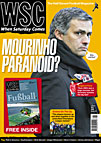 The appointment of a famous figure from the world of rugby league has angered many at the JJB. Yuri Goffinet reports
The appointment of a famous figure from the world of rugby league has angered many at the JJB. Yuri Goffinet reports
On March 15, Wigan fans reacted with disbelief to the news that Maurice Lindsay, a famous figure in rugby league and the man who ran Wigan Warriors for many years, had managed to get himself elected on to the board of the town’s football club. To Wigan Athletic supporters, Lindsay is the propagandist supreme of rugby league, a man who took every opportunity to belittle the “soccer” club during the Eighties and Nineties. Even as recently as last season, when the Latics were in dispute with the Greater Manchester constabulary about what chairman Dave Whelan thought were extortionate policing fees, Lindsay immediately distanced himself from the controversy, pointing out that they had no such problems at the rugby.
This was only the latest in a long line of statements meant to drive a wedge between the two clubs in Wigan. In 1987, Athletic hosted Leeds in a League Cup quarter-final – a big game for what was then a small club living on limited means. Who does the BBC invite to comment on that game from the Wigan camp but our friend Maurice, whose patronising comments about Latics being a “nice little club who have chosen the back yard of rugby league” to play in, is what most Wigan fans remember of that day. At the time survival was a struggle for Athletic, while the rugby league side, like a Chelsea of their day, crushed everyone in their path.
Lindsay contributed as much as anybody to the myth of Wigan being a rugby town, where football was an irrelevance, but the truth is rather different. As in many other towns, the people of Wigan will turn out to support a successful team and today it is the Premiership side that attract attention while the rugby club seem to be in long-term decline, particularly since Lindsay’s return to the helm in 1999. Talk of closer bonds between the two clubs wasn’t on the cards back in 1989, when Athletic were refused permission to play their League Cup tie against Liverpool at Central Park, or earlier in the 1980s, when they were about to go bust and bucket collections at the ground helped pay players’ wages. Only now, when Premiership millions are rattling in the till, does sporting solidarity suddenly seem attractive.
Throughout the years, Lindsay has, through insinuation, belittled Wigan Athletic, while enjoying his influence with the local and, up to a point, national media. He is too clever to have ever come out and wished outright failure on the Latics, but no one remembers anything but condescending, half-hearted praise.
The cynical fan might put that aside and consider that an experienced lobbyist would be a useful addition to the board. But what experience does Lindsay bring with him? He ran a club playing a minority sport that took advantage of their unbalanced wealth in a largely semi-professional league. Could having good press contacts in Wigan really be construed as a step towards influence in the wider media world? We can only assume this was the thinking behind Whelan’s decision.
Athletic’s newer fans are rarely, if ever, prepared to concede that our chairman can make mistakes, but others have reacted rather differently and been galvanised to form the Latics Independent Supporters Association (LISA), which will give a voice to those fans for whom “living the dream” has not meant losing their critical faculties.
From WSC 231 May 2006. What was happening this month